Which country started Afrobeats?
Which country started Afrobeats? Which country started Afrobeats? Afrobeat evolved in Nigeria in the late 1960s by Fela Anikulapo Kuti, (born Olufela Olusegun Oludotun) who, with drummer Tony Allen, experimented with different contemporary music of that time.
AFROBEATS UPDATES
9/11/20242 min temps de lecture
Afrobeat was influenced by a combination of different genres, such as highlife, fuji, and jùjú,[12] as well as Yoruba vocal traditions, rhythm, and instruments.[13] In the late 1950s, Kuti left Lagos to study abroad at the London School of Music, where he took lessons in piano[14] and percussion[15] and was exposed to jazz. Fela Kuti returned to Lagos and played a highlife-jazz hybrid, albeit, without commercial success.[4]
Listen to the hottest afrobeat tracks here
In 1969, Kuti and his band went on a trip to the U.S. and met a woman by the name of Sandra Smith, a singer and former Black Panther. Sandra Smith (now known as Sandra Izsadore or Sandra Akanke Isidore) introduced Kuti to many writings of activists such as Martin Luther King Jr., Angela Davis, Jesse Jackson, and his biggest influence of all, Malcolm X.[7]
As Kuti was interested in African-American politics, Smith would make it her duty to inform Kuti of current events; in return, Kuti would fill her in on African culture. Since Kuti stayed at Smith's house and spent so much time with her, he started to re-evaluate his music genre. That was when Kuti realized that he was not playing African music. From that day forward, Kuti changed his sound and the message behind his music.[16]
Upon arriving in Nigeria, Kuti had also changed the name of his group to "Africa '70". The new sound hailed from a club he established called the Afrika Shrine. The band maintained a five-year residency at the Afrika Shrine from 1970 to 1975 while Afrobeat thrived among Nigerian youth.[7] Another influential person Ray Stephen Oche [de], a Nigerian musician touring from Paris, France, with his Matumbo orchestra in the 1970s.
The name was partially born out of an attempt to distinguish Fela Kuti's music from the soul music of American artists such as James Brown.[17]
Prevalent in his and Lagbaja's music are native Nigerian harmonies and rhythms, taking contrasting elements and combining, modernizing, and improvising upon them. Politics is essential to Afrobeat, due to Kuti using social criticism to pave the way for change. His message can be described as confrontational and controversial, which relates to the political climate of most of the African countries in the 1970s, many of which were dealing with political injustice and military corruption while recovering from the transition from colonial governments to self-determination. As the genre spread throughout the African continent, many bands took up the style. The recordings of these bands and their songs were rarely heard or exported outside the originating countries but many can now be found on compilation albums and CDs from specialist record shops
LETS LISTEN AND REVIEW FOR FREE
Submit Your Music
Follow us on Social Media.
tunecamplive@gmail.com
Whatsapp Contact: +12342651035
© 2024. All rights reserved.


